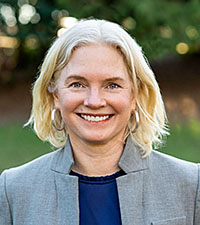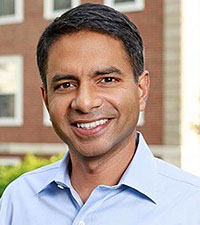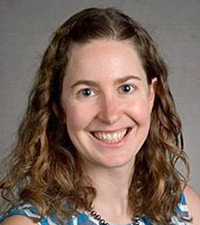NBER Coordinating Center on the Economics of AD/ADRD Prevention, Treatment, and Care
First Annual Meeting
This page will be updated as information becomes available.
Keynote Speakers

Courtney Van Houtven, PhD
Professor in the Department of Population Health Science, Duke University School of Medicine and Duke-Margolis Institute for Health Policy | Research Scientist, Health Services Research and Development in Primary Care, Durham Veterans Administration
About: Dr. Courtney Van Houtven is a Professor in The Department of Population Health Science, Duke University School of Medicine and Duke-Margolis Institute for Health Policy. She is also Director of the Center to Advance the Science of Complex Care: Aging, Disability and Equity (CASCADE) at Duke University. Dr. Van Houtven’s aging and economics research interests encompass long-term care financing, intra-household decision-making, unpaid family and friend care, and home- and community-based services. She examines how family caregiving affects health care utilization, expenditures, health and work outcomes of care recipients and caregivers. She strives to identify pragmatic trials, care models, and policies that optimize the ability of people with complex care needs to age in place while at the same time supporting their family and friend caregivers.

Amitabh Chandra, PhD
Ethel Zimmerman Wiener Professor of Public Policy, Harvard Kennedy School | Henry and Allison McCance Professor of Business Administration, Harvard Business School
About: Professor Amitabh Chandra is the Ethel Zimmerman Wiener Professor of Public Policy and Director of Health Policy Research at Harvard Kennedy School, and the Henry and Allison McCance Family Professor of Business Administration at Harvard Business School. He chairs the joint MS/MBA program and executive education in life sciences, leads the Pagliuca Harvard Life Lab committee, and serves on the board of the Blavatnik Fellows program.
His research spans innovation and pricing in the biopharmaceutical industry, value in healthcare, medical malpractice, racial disparities, and new methods for treating Alzheimer’s. His work has been published in top journals including the American Economic Review, Journal of Political Economy, New England Journal of Medicine, and Science, and supported by the NIH and the Robert Wood Johnson Foundation.
Professor Chandra has advised the U.S. Senate, the U.S. Commission on Civil Rights, and state governments, and served as Massachusetts’ Special Commissioner on Provider Price Reform. He is a member of the Congressional Budget Office’s Panel of Health Advisors. He is an elected member of the American Academy of Arts and Sciences, the National Academy of Medicine, and the National Academy of Social Insurance, his awards include the NIHCM Research Award, the Kenneth Arrow Award, the Eugene Garfield Award, and the ASHE Medal, honoring significant contributions to health economics by an economist under 40.
Panelists

Gopi Shah Goda, PhD
Director of Retirement Security Project, Alice M. Rivlin Chair in Economic Policy, Senior Fellow of Economic Studies, Brookings
About: Dr. Gopi Shah Goda is the director of the Retirement Security Project, the Alice M. Rivlin Chair in Economic Policy, and senior fellow in Economic Studies at the Brookings Institution. She is also a research associate at the National Bureau of Economic Research (NBER) and a fellow of the Society of Actuaries. Dr. Goda conducts research that informs how policy can best serve aging societies, including how individuals make healthcare, saving and retirement decisions as they age and the sustainability of public programs serving older populations. Her work has appeared in a variety of leading economics journals, has garnered coverage in major media outlets, and has frequently been cited in policy discourse, including government reports, agency rulemaking, and by legislative bodies. Dr. Goda served as a senior economist at the White House Council of Economic Advisers from July 2021 to July 2022, and was on California Governor Gavin Newsom’s Council of Economic Advisors from January to August 2024.

Yulya Truskinovsky, PhD
Associate Professor of Economics, Syracuse University
About: Yulya Truskinovsky is an Associate Professor of Economics at Syracuse University. Her research interests fall at the intersection of labor, aging, and health, with a particular emphasis on long term care and the economics of caregiving. Her interdisciplinary research agenda has been supported by grants from federal agencies including the National Institutes of Aging and nonprofits such as the Sloan Foundation. Currently, she is the principal investigator on an R01 from the National Institute on Aging to study the impact of the COVID-19 pandemic on long-term care for older adults. Dr. Truskinovsky earned her Ph.D. in Economics from Duke University in 2016. Prior to joining Syracuse University, she served as an Assistant Professor of Economics at Wayne State University.

Katherine Miller, PhD
Assistant Professor, Health Policy and Management, Johns Hopkins University
About: Katherine Miller is an Assistant Professor in Health Policy and Management at the Bloomberg School of Public Health at Johns Hopkins University. As a health services researcher, I apply an economic lens to research at the intersection of aging and health policy evaluation. I am interested in understanding how public policies impact the long-term care workforce and the people with complex medical needs for whom they care. Collectively, my work examines the effects of policies and interventions on outcomes of the workforce (e.g., wages of the paid caregivers and well-beings of unpaid/family caregivers); the mechanisms impacting quality of care (e.g., turnover); and, patient outcomes across the spectrum of long-term care settings. While these are my core research questions, I am also interested in understanding disparities in long-term care by rurality.

Lauren H. Nicholas, PhD, MPP
Professor, Center for Bioethics and Humanities and Division of Geriatrics at Colorado University School of Medicine, Department of Economics at Colorado University
About: Lauren Hersch Nicholas is a health economist and professor in the division of geriatric medicine at the University of Colorado School of Medicine. Her research focuses on the role of public policy in improving health and healthcare quality for the elderly. Her current research combines survey, administrative, and clinical data to study the interaction between healthcare utilization and economic outcomes. Dr. Nicholas’s work uses clinical and econometric approaches to answer questions in medical and health economics, particularly for dementia, surgery and end-of-life care. She is a leading expert on the financial symptoms and consequences of dementia, work that has been featured in The New York Times, The Wall Street Journal, The Washington Post, and other major media outlets.

Cyrus Kosar, PhD
Assistant Professor of Health Services, Policy and Practice
About: Cyrus Kosar is health services researcher and health economist whose research broadly pertains to the delivery of care in the Medicare Program. More specific areas he has focused on include post-acute care, long-term care, end-of-life care, rural health care, risk-adjustment, Medicare Advantage, extreme weather events and Medicare spending, and scope of practice reform.

Amresh Hanchate, PhD
Professor of Social Science and Health Policy, Wake Forest University School of Medicine
About: Amresh D. Hanchate, PhD, is a Professor in the Department of Social Sciences and Health Policy and Director of the Program in Health Services Research at the Wake Forest University School of Medicine. He is a health economist with research interests in the evaluation and cost-effectiveness of healthcare policies and interventions. He has long-standing experience in the use of large administrative and medical records data and application of econometric methods for impact evaluation. His work has been funded by the NIH, AHRQ, and VA. His current research examines the role of home-based medical care and telemedicine in ADRD care in traditional Medicare and Medicare Advantage.

Péter Hudomiet, PhD
Senior Economist, RAND Corporation
2:30 PM PANEL: Early Detection, Causes, and Classification of Dementia Symptoms
About: Péter Hudomiet is a senior economist at RAND. His research interests include applied econometrics, labor economics, economics of aging, and health economics. Most recently, he has published papers about trends and inequalities in mortality, health, and the prevalence of dementia in the United States; the age profile of life satisfaction after age 65; the effect of technological change on retirement; subjective and objective job demands at older ages; and the impact of psychological factors and personality traits on retirement outcomes. He is currently researching the effect of the COVID-19 pandemic on the cognitive health and mortality of the older US population, the impact of job characteristics on dementia, and the accuracy of dementia classifications in Medicare data. He is also developing a novel probabilistic approach to classify dementia status in Medicare data. Hudomiet holds a Ph.D. in economics from the University of Michigan, an M.A. in economics from the Central European University, and an M.Sc. in computer science from the Budapest University of Technology.

Michelle Marie Mielke, PhD
Professor, Epidemiology and Prevention, Wake Forest University School of Medicine
2:30 PM PANEL: Early Detection, Causes, and Classification of Dementia Symptoms
About: Michelle M. Mielke, is currently Chair of the Department of Epidemiology and Prevention in the Wake Forest University School of Medicine, Professor of Epidemiology, and Professor of Gerontology and Geriatric Medicine. She also directs the Real-world Advocate DAta for Research (RADAR). Dr. Mielke works as a translational epidemiologist to further understanding of the etiology and epidemiology of neurodegenerative diseases. One focus of her research is understanding the utility of blood-based biomarkers for implementation at the population-level for diagnosing Alzheimer’s disease and related dementias. Another focus of Dr. Mielke’s research is on understanding sex and gender differences in the development and progression of Alzheimer’s disease and related dementias. Dr. Mielke is PI of several NIH- and Foundation-funded clinical- and epidemiological-based grants, is a member of multiple NIH, FDA, and DoD panels, and has published over 490 manuscripts. She received the John R. Raymond Mentor Award from the Women Scholars Initiative and is a Fellow in the American Association for the Advancement of Science (AAAS), Section on Neuroscience. She has published more than 480 papers.

Brian Beach, PhD
2:30 PM PANEL: Early Detection, Causes, and Classification of Dementia Symptoms
About: Dr. Brian Beach is an Associate Professor of Economics at Vanderbilt University and a Research Associate at the National Bureau of Economic Research (NBER). His research examines how exposure to disease and environmental toxicants affect health and productivity (e.g., educational attainment and labor market outcomes). He often studies historical settings where it is possible to observe both early-life exposures and later-life outcomes. A core contribution of this research is the use contextual features to produce a research design that better supports a causal interpretation. His research on the 1918 Influenza Pandemic received significant attention during the COVID-19 Pandemic, and his work on water and sewer infrastructure was recently featured on the Freakonomics podcast. Dr. Beach earned his PhD in Economics from the University of Pittsburgh in 2015 and served as an Assistant Professor of Economics at William & Mary from 2015 to 2019.
Panel Moderators

Rhoda Au, PhD
Principal Investigator, NBER Coordinating Center on the Economics of AD/ADRD
2:30 PM PANEL: Early Detection and Classification of Dementia Symptoms
About: Rhoda Au is Professor of Anatomy and Neurobiology, Neurology, Medicine & Epidemiology at the Boston University Chobanian & Avedisian School of Medicine and School of Public Health, and one of the PIs of the Framingham Heart Study Brain Aging Program, where she is Director of Neuropsychology. She is also part of the Diagnostics Accelerator, which strives to fast-track the development of accessible and non-invasive tools to revolutionize AD diagnosis and treatment. She is Director of Global Cohort Development for the Davos Alzheimer’s Collaborative. Her research on cognitive aging and dementia focuses on using technology to develop a multi-sensory brain health monitoring platform that is customizable, technology agnostic, and scalable to allow for broad global representation in AD research.

Julie Bynum, MD
Principal Investigator, NBER Coordinating Center on the Economics of AD/ADRD
About: Julie Bynum is the Margaret Terpenning Professor of Internal Medicine at the University of Michigan Medical School and Director of the NIA-funded Center to Accelerate Population Research in Alzheimer’s (CAPRA). She is also PI on an R01 studying healthcare patterns across the full spectrum of cognitive decline in a racially diverse population, and on a state contract studying provision of long-term services in nursing homes and Medicaid waivers. She has been an Atlantic Philanthropies Health & Aging Policy Fellow and is a member of the National Academy of Medicine Forum on Aging, Disability and Independence. She received her medical and public health degrees from Johns Hopkins, did her residency at Dartmouth, and completed Geriatric Medicine specialty training at Johns Hopkins.

Kathleen M. McGarry, PhD
Principal Investigator, NBER Coordinating Center on the Economics of AD/ADRD
About: Kathleen McGarry is the Chair of the Economics Department at UCLA. She is a leading scholar in the study of long-term care expenditures, caregiving relationships and burdens within families. She is currently the Director of the NBER project on Alzheimer’s Disease and Approaches to Long-Term care in the United States and Around the World. She previously served as a senior economist at the Council of Economic Advisers and has had fellowships from the Brookdale Foundation and the National Bureau of Economic Research. Her research focus is on elderly well-being in relation to public and private transfers (i.e., Medicare and SSI programs) and resource transfer within families.
